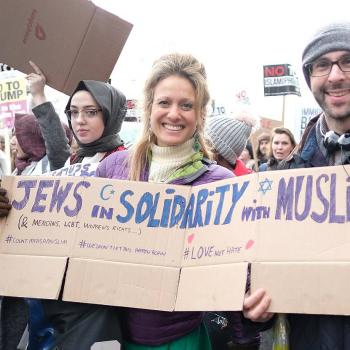I’m going to try to briefly respond to a reader’s thoughtful criticisms of my observations on Wahhabism/Salafism.
I disagree with it strongly on numerous counts, but I
appreciate and respect the commentor’s perspective, and hope he’ll take my response in
the constructive spirit it is intended.
First, I want to emphasize that I am NOT interested
in bashing Wahhabis and, as I said, I have been known to defend them when I thought
they were getting a bum rap. My interest is
in an honest and constructive discussion of a cluster of important issues about
which there is considerable legitimate disagreement within the Muslim community.
I’m reproducing it below with my comments interspersed.
Svend, it was hard for me to even read further when you kept on using "Wahhabi/Salafi" as if the things are interchangeable. They are not. One cannot even properly talk about Salafism being readily stereotyped into one neat little group. Salafism has a wide range of beliefs, so to reduce it all down to one thing is wrong.
Today, I think these terms are basically interchangeable. They certainly are in popular usage, as the original "Salafis" have basically gone extinct. Or perhaps a better way to put it would be that Salafism is under new management.
As to "Wahabism", that term really came to use by people who do not know about Islam. It is kind of like the people who are known as the Pennsylvania Dutch. They are not Dutch, but rather German, but people who didn’t know any better needed to stick a label on them and that was most convenient, after all didn’t they call themselves "Deutsch"? Never mind that is the German word for "German".
First, I think it’s a fact that Wahhabi Islam differs in significant ways from what most Muslims today would consider traditional Islam, so a label of some sort is justified.
Second, while it’s perhaps not entirely fair that "Wahhabi" has become politically radioactive and laden with negative connotations (some of which I think have been earned, I’m afraid), I do not agree that the term is misleading.
I realize that the label “Wahhabi” has acquired pejorative
connotations. Some of these connotations
are deserved and others are not, in my opinion, but I don’t see how one can
deny the link. The philosophical, methological and historical links are
self-evident and deep, I think. It’s
like denying that Marxists are are inspired by Marx. Where else could they have gotten their economic
views from?
I also do not accept that it is in any way pejorative or
divisive to use a label like “Wahhabi”. Like
labels such as “Shia”, “Sunni”, “Chisti”, “Barelvi”, …, it describes a perspective
that exists within the Ummah today. All these labels describe Muslims, even if we
may disagree on where the true boundaries of Islamic orthodoxy may lay. All describe shared beliefs and
assumptions. In some cases, they also
acknowledge an important historical link and debt to a scholar of the past that
should never be denied, least of all by his later fellowers.
Then there’s the fact that those who are commonly called Wahhabis
actively promote the works of Muhammad ibn al-Wahhab, especially his “Kitab
al-Tawhid”.
You ascribe things to Salafis that I have never seen amoungst the "Salafi" I know, although I think you’d be hard pressed to find a real "Salafi" who would even describe themselves as such. I have never seen any of them attack Sufis or Shi’a, they tend to be too wrapped up in their intense observance to worry about what others are doing.
You seem to assume that a more passive Wahhabi–i.e., one who does not act on core Wahhabi beliefs concerning shirk–is somehow fundamentally different from a Wahhabi who actively attacks Wahhabism’s traditional targets (both figuratively and literally), Sufis and Shiahs. The worldview is the same in both cases, as far as I can see. (Are there any "Salafis" who think that Sufis are Ahl Sunnah wal Jamma?)
Have you read Tariq Ramadan? I believe he breaks down the "Salafi" movement into about 6 different parts, the majority of which bare no relationship to what you or other Americans who dislike the Salafi talk about.
I have not read TR on Wahhabism/Salafism. If you can provide me a reference to look this up, I’d greatly appreciate it.
I’d be really surprised if TR defines himself as "Salafi" in a general sense.
As to the man Wahab himself, I think he has gotten a bad rap. I would think you have read about him and read what he wrote right? I would think so as you are writing about him and the movement wrongly put on him. I don’t think his writings, nor his life for that matter, really point to what is happening in Saudi Arabia at the moment. I believe that other scholars like Ibn Kathir, Ibn al-Qayyim and particularly Ibn Taymiya, played a much greater and more influential role than Wahab. But I guess it would be hard for the non Muslims slamming "traditional Muslims" to talk about "Taymiyameen" or some other such nonsense label.
We have to agree to disagree here.
I’m afraid everything I’ve seen leads me to think he’s gotten off pretty easy. Once the oil wells dry up, I think historians will be quite unkind to Muhammad Ibn al-Wahab. I mean no offense to you or anybody else, but I really think his ideas represented a giant step backward on a host of grounds.
I also don’t see how one can minimize his contribution to Wahhabism.
To use this label is a mistake, and not only that, it just isn’t accurate. Does this mean because I reject this label that I support the radicals in Saudi? Far from it, as someone married to a Saudi citizen and who has suffered because of my dealings with the Saudis, I hate them as much as anyone. But lets be accurate in our portrayals of these people.
I agree wholeheartedly with the sentiment that Saudis, Wahhabis and everyone else deserve accurate and fair portrayals.
Wahabi/Wahabism is now as much as a pejorative term as "terrorist" and has really lost any real meaning. It is more of an insult now to be thrown out against people who might be more conservative than you in their religious beliefs or who might disagree with you on certain ideas.
The term is certainly abused–I particularly get a kick out of uninformed Islamophobic hacks who try to pin it on everybody from Salam al-Maryati to Hussein Ibish–but that doesn’t change its legitimate place in scholarly debate.
There are Sufis, both today and historically, that are VERY conservative and traditional in their teachings and actions. Are they Wahabi? It is said that the great Salafi scholar himself, Ibn Taymiya, was a Sufi himself. Since he is the basis of "Wahabi" thought, shouldn’t all "Wahabis" be called "Sufis" because they follow a teacher who was Sufi? Maybe we should instead be talking about "Wasufis" instead of "Wahabis"?
This is a good point. I also find it frustrating how mainstream discussions tend to treat Wahhabism as simply equivalent to conservativism.
As I noted in my original post, many of the ills popularly ascribed to Wahhabism are by no mean unique to–or even clearly associated with–Wahhabis. For example, problems such as anti-Semitism and misogyny are found as much among Wahhabis as their opponents.
What we are really dealing with here is a twisted version of religion and cultural practice. This happens everywhere in the world, from gang rapes in Pakistani to regain honours of tribes supposedly given an Islamic veneer, to the ban on women driving in Mecca that is more tribal based than religion.
Well, I agree but only up to a point. I can concede that some (perhaps much) of what we perceive as Wahhabism today is a manifestation of these universal human problems. At the same time, there is this school of thought that has wielded enormous influence in the modern world which has supplied a veneer of scholarly credibility to these abuses and misconceptions.
Isn’t it interesting to note that the places where "Wahabism" has taken root the most are the tribal places of the world, Afghanistan, Pakistan and the like? Why? Because these people accepted and recognised the true tribal roots of the movement and it fits into their lifestyles.
As comforting and convenient as this reading is to those of us who oppose Wahhabism, I don’t buy it. I think Wahhabism has often appealed to significant segments of urban elites and the petit bourgeousie. More importantly, its influence today is by no means limited to such strata of society. Quite the contrary, Wahhabis today tend to be urban professionals (hence the scourge of all these engineers).
Wahabism is to Islam what terrorism is, what Islamofacism is. It is a pejorative term, an abusive term, one grounded in ignorance.
True and untrue, in my opinion. Don’t have the time to explain further.
Some other observations…
Still, while I ultimately disagree with their contention
that the term is prejudicial or misleading, I am not out to offend Wahhabis
gratitiously, such I am perfectly happy to meet them half-way and adopt another,
mutually agreed upon term. For example,
Wahhabis (and, as chance would have it, Druze )
have tended to be fond of the term “Muwahhidun”. Works for me.
But I can’t pretend Wahhabism is a figment of our
imagination or that Wahhabis don’t differ in important respects from what I
understand to be the prevailing consensus among Sunni Muslims. The existence of such distinctions doesn’t
necessarily delegitimize them, either. (Truth
isn’t determined by a poll, even among scholars.) For whatever it’s worth, there are issues on
which I consider the apparent consensus among Sunni scholars today to dead
wrong.
Now for the Salafi/Wahhabi disctinction. In a way we agree—I see Salafism (as in the
original message of the reform movement led by of Muhammad Abduh, Rashid Rida
and others) as radically different from Wahhabism (there’s a reason why the
writings of both have been banned at times in Saudi Arabia).
However, as I think Khaled Abou El Fadl shows
in his unfortunately polemically entitled but I think otherwise quite scholarly
book, The Great Theft: Wrestling Islam from the Extremists the original Salafis have all but gone extinct and been
replaced by Wahhabis in popular discourse. He argues that since the 1970s, Salafism and Wahhabism have been
interchangeable due to a combination of the conscious adoption of the former
label by Wahhabis and the fact that there simply aren’t very many old-style
Salafis left. Their brand of reform fell
out of favor around the Muslim world in the 1960s and 1970s. Thus, El Fadl refers to modern “Salafabism”,
which I think is an inelegant, but nonetheless accurate term, as it conveys the
reality of these movements’s convergence in recent decades.
Another point to bear in mind is that there were some very
significant assumptions shared by both the original Salafis and Wahhabis. Both were critical of Sufism, Shiism,
madhabs, taqlid, etc. In these
questions, the differences between them were more the intensity with which the
views were expressed than the actual assumptions. Salafism clearly inherited certain ideas from
Wahhabism. So there actually is some
overlap between the two schools, which I think also contributed to this
transformation
One can quibble that some contemporary reformers are walking
in the footsteps of the original Salafis, but I don’t think they’d identify
themselves simply as “Salafi” as they know full well that the term is no longer
associated with those early reformers in the Islamic imagination.
I do not rule out there being a range of opinions and
schools of thought within Wahhabism (e.g., I’ve heard that Al-Albani has fallen
out of favor with stricter Wahhabis.), but I do not think any such diversity has
been communicated widely to the outside world or translated into Wahhabi "policy" internationally. On the issues for which Wahhabis are best known (i.e., the issues they’ve
focused on much in their literature intended for the broader Muslim community),
I perceive marked uniformity. If there are a
lot of types of Wahhabis, it’s not evident in their message to the rest of us.
Perhaps that’s changing (e.g., perhaps AlMaghrib represents a new paradigm for Wahhabism). Even if that’s the case, these generalizations hold for most of the last few decades.
The bottom line, I think, is this is an area where Muslims have
to agree to disagree and remember the principles of adab. Non-Wahhabis Muslims must guard against the
temptation to scapegoat the Wahhabi minority to score political points for
themselves with outsiders. Wahhabis need to realize that they cannot reasonably expect other
Muslims to treat their understanding of Islam as normative and that,
consequently, the term “Wahhabi” is not inherently pejorative nor the
discussion of Wahhabism inherently anti-Wahhabi.















